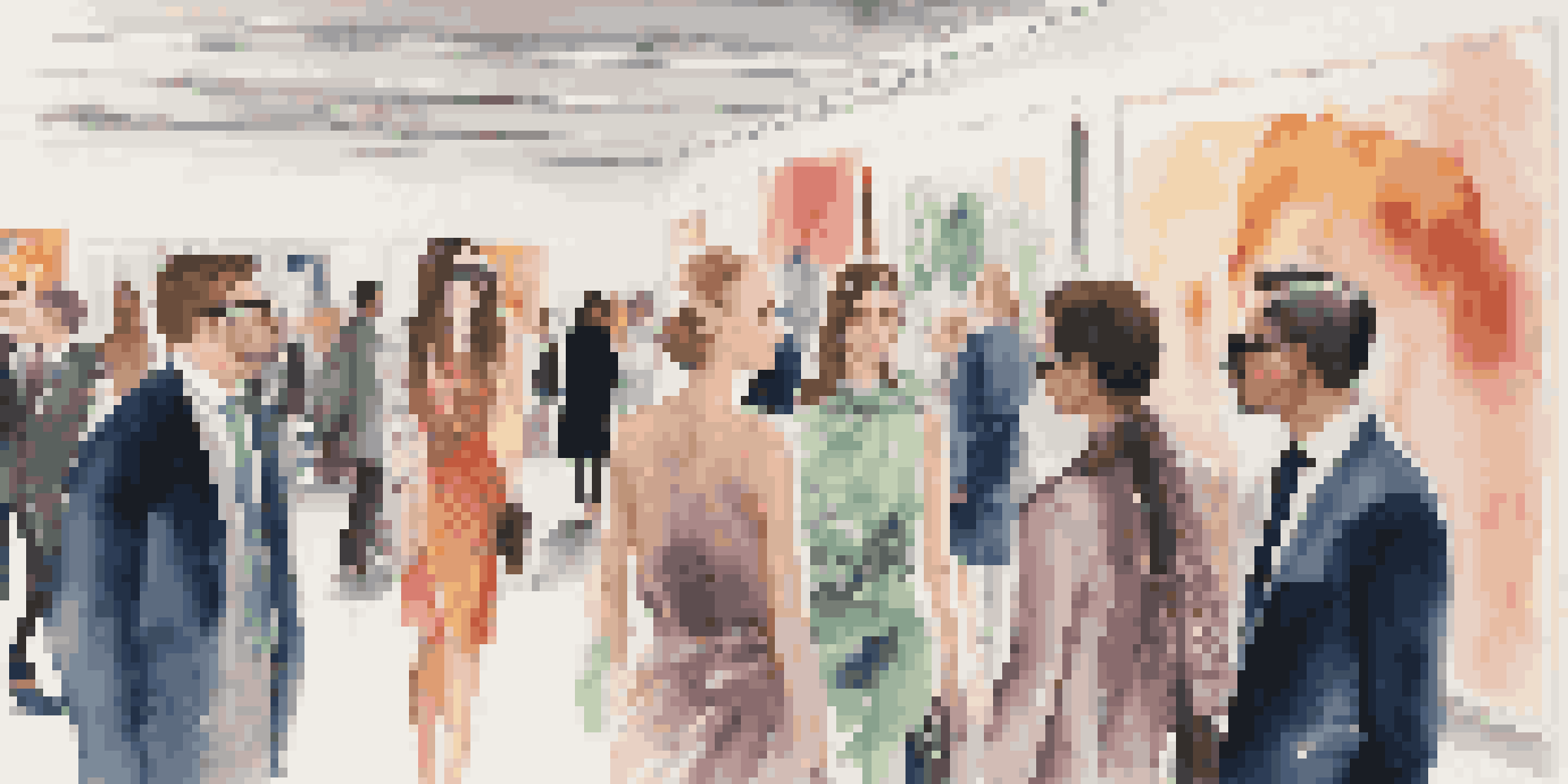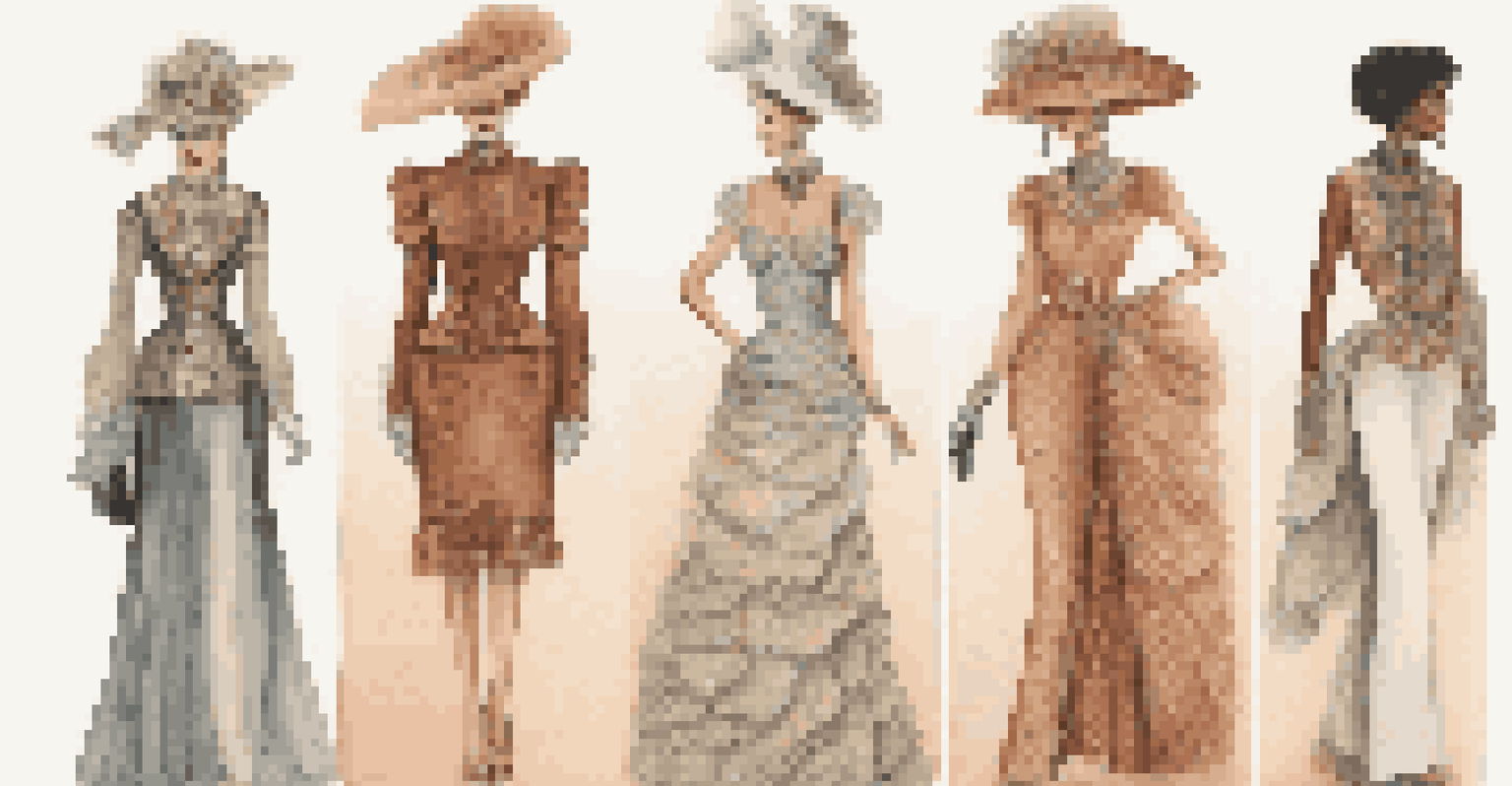The Role of Fashion Critics in Luxury Fashion Iconography

Understanding the Role of Fashion Critics
Fashion critics play a pivotal role in shaping public perception of luxury fashion. They analyze and critique collections, offering insights that help consumers understand the nuances of style and design. This critical lens not only influences consumer choices but also affects how brands are positioned in the market.
Fashion is the armor to survive the reality of everyday life.
Through their reviews, fashion critics highlight trends and innovations, essentially guiding the conversation around luxury fashion. Their perspectives can elevate a designer's status or cause a collection to fade into obscurity, illustrating their power in the industry. By providing context and depth, critics help demystify the often exclusive world of high fashion.
Moreover, fashion critics serve as a bridge between creators and consumers, making fashion more accessible. They can transform complex design concepts into relatable narratives, allowing a broader audience to appreciate the artistry involved. This connection enriches the luxury fashion landscape, fostering a community of informed enthusiasts.
Fashion Critics as Cultural Commentators
Fashion critics don't just analyze clothing; they comment on cultural shifts reflected in fashion. Their critiques often intersect with broader societal issues, such as gender, race, and sustainability. By addressing these themes, critics underscore fashion's role as a mirror to society, influencing how luxury brands respond to contemporary challenges.

For instance, a critic might highlight how a designer's latest collection speaks to environmental concerns, pushing brands to adopt more sustainable practices. This not only shapes public opinion but also encourages designers to be more socially responsible. Critics, therefore, act as catalysts for change within the luxury fashion industry.
Fashion Critics Shape Consumer Choices
Fashion critics analyze collections and trends, significantly influencing public perception and consumer behavior in luxury fashion.
Through their cultural commentary, fashion critics help to elevate the narrative surrounding luxury fashion, making it not just about aesthetics but about values and ethics. This deeper understanding enriches the consumer experience, turning fashion into a dialogue rather than a monologue.
The Influence of Social Media on Fashion Criticism
With the rise of social media, the landscape of fashion criticism has transformed dramatically. Critics now share their insights across platforms like Instagram and TikTok, reaching wider audiences and influencing trends in real time. This democratization of fashion commentary allows diverse voices to emerge, enriching the conversation around luxury fashion.
Fashion is about dreaming and making other people dream.
However, this shift also comes with challenges. The immediacy of social media can lead to superficial critiques that prioritize clicks over depth. As a result, the role of traditional fashion critics is evolving, requiring them to adapt their approaches to maintain relevance in a fast-paced digital world.
Despite these challenges, social media provides a unique opportunity for critics to engage with audiences directly. They can receive instant feedback and foster a community of fashion enthusiasts, transforming the criticism process into a collaborative experience. This interaction adds a dynamic layer to the conversation around luxury fashion.
The Impact of Fashion Critics on Brand Reputation
The reviews and opinions of fashion critics can significantly impact a luxury brand's reputation. A well-articulated critique can elevate a brand's status, drawing attention to its craftsmanship and creativity. Conversely, negative reviews can tarnish a brand's image, influencing consumer perceptions and sales.
For luxury brands, maintaining a positive relationship with critics is essential. Many brands invite critics to exclusive events, hoping to cultivate goodwill and encourage favorable coverage. This symbiotic relationship highlights the importance of critics in shaping brand narratives within the luxury sector.
Critics as Cultural Commentators
By addressing societal themes like sustainability and inclusivity, fashion critics highlight the cultural relevance of luxury fashion.
Ultimately, fashion critics serve as guardians of quality, holding brands accountable for their claims and practices. Their role ensures that luxury fashion maintains its standards, pushing brands to innovate while adhering to the principles of excellence that define the industry.
Fashion Critics and the Evolution of Design Trends
Fashion critics are instrumental in the evolution of design trends, often setting the stage for what becomes popular in luxury fashion. They spotlight emerging designers and groundbreaking concepts, giving them the visibility needed to thrive. This recognition can turn obscure talents into household names, shaping the future of fashion.
For example, when critics rave about a designer's unique use of color or texture, it can spark a trend that resonates across the industry. Designers, inspired by critiques, may incorporate these elements into their future collections, leading to a cycle of innovation and inspiration. This symbiotic relationship fosters a vibrant fashion ecosystem.
Moreover, critics often serve as trend forecasters, using their expertise to predict what will resonate with consumers. Their insights can guide brands in decision-making, ensuring that they remain ahead of the curve. As a result, fashion critics play a crucial role in shaping not just the present, but the future of luxury fashion.
The Ethical Responsibility of Fashion Critics
With great power comes great responsibility, and fashion critics are no exception. Their words can influence public perception and consumer behavior, making it essential for them to approach their critiques with integrity. Ethical criticism involves being honest yet constructive, ensuring that feedback is rooted in respect for the art of fashion.
Critics also have a responsibility to consider the broader implications of their reviews. For instance, they should be mindful of the impact their words can have on designers, especially emerging talents who may be vulnerable to harsh critiques. By fostering a culture of support and encouragement, critics can contribute positively to the fashion community.
Social Media Transforms Criticism
The rise of social media has democratized fashion criticism, allowing diverse voices to shape trends while posing new challenges for traditional critics.
Additionally, ethical fashion criticism involves advocating for diversity and inclusion within the industry. Critics have the power to elevate marginalized voices and promote brands that prioritize ethical practices. By championing these values, they can help reshape luxury fashion into a more equitable and sustainable industry.
The Future of Fashion Criticism in Luxury Fashion
As the luxury fashion landscape continues to evolve, so too does the role of fashion critics. The integration of technology and changing consumer behaviors are reshaping how critics engage with their audiences. Critics are now tasked with navigating an ever-shifting terrain, balancing traditional critique with the demands of a digital-first world.
Looking ahead, we can expect fashion critics to become even more influential in shaping trends and brand narratives. As they adapt to new platforms and forms of communication, their ability to connect with audiences will only grow. This evolution presents exciting opportunities for critics to redefine their roles within the luxury fashion ecosystem.

Ultimately, the future of fashion criticism will be characterized by greater inclusivity and diversity. As more voices join the conversation, we can anticipate a richer, more nuanced dialogue around luxury fashion. This shift not only benefits critics but also enhances the overall consumer experience, making fashion a more collaborative and engaging endeavor.